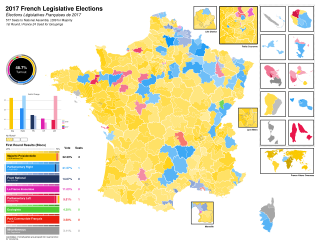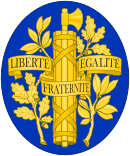
The president of France, officially the president of the French Republic, is the executive head of state of France, and the commander-in-chief of the French Armed Forces. As the presidency is the supreme magistracy of the country, the position is the highest office in France. The powers, functions and duties of prior presidential offices, in addition to their relation with the prime minister and government of France, have over time differed with the various constitutional documents since the Second Republic.
An electoral college is a set of electors who are selected to elect a candidate to particular offices. Often these represent different organizations, political parties or entities, with each organization, political party or entity represented by a particular number of electors or with votes weighted in a particular way.

Edgar Jean Faure was a French politician, lawyer, essayist, historian and memoirist who served as Prime Minister of France in 1952 and again between 1955 and 1956. Prior to his election to the National Assembly for Jura under the Fourth Republic in 1946, he was a member of the French Committee of National Liberation (CFLN) in Algiers (1943–1944). A Radical, Faure was married to writer Lucie Meyer. In 1978, he was elected to the Académie Française.

The Fifth Republic is France's current republican system of government. It was established on 4 October 1958 by Charles de Gaulle under the Constitution of the Fifth Republic.

The National Assembly is the lower house of the bicameral French Parliament under the Fifth Republic, the upper house being the Senate. The National Assembly's legislators are known as députés, meaning "delegate" or "envoy" in English; etymologically, it is a cognate of the English word deputy, which is the standard term for legislators in many parliamentary systems).

The current Constitution of France was adopted on 4 October 1958. It is typically called the Constitution of the Fifth Republic(French: Constitution de la Ve République), and it replaced the Constitution of the Fourth Republic of 1946 with the exception of the preamble per a 1971 decision of the Constitutional Council. The current Constitution regards the separation of church and state, democracy, social welfare, and indivisibility as core principles of the French state.

France is a unitary semi-presidential republic with a bicameral legislature. Public officials in the legislative and executive branches are either elected by the citizens or appointed by elected officials. Referendums may also be called to consult the French citizenry directly on a particular question, especially one which concerns amendment to the Constitution.

Legislative elections were held in French Polynesia on 23 May 2004 to elect members of the Assembly.

Jean-Louis Debré is a former French judge and politician who served as President of the National Assembly from 2002 to 2007 and President of the Constitutional Council from 2007 to 2016. He was Minister of the Interior from 1995 until 1997 during the presidency of Jacques Chirac. Since 2016 he has been President of the Superior Council of Archives.

Legislative elections were held in France on 12 and 19 March 1978 to elect the sixth National Assembly of the Fifth Republic.

The Congress of the French Parliament is the name given to the body created when both houses of the present-day French Parliament—the National Assembly and the Senate—meet at the Palace of Versailles to vote on revisions to the Constitution or to listen to an address by the President of the French Republic.

Zarifou Ayéva is a Togolese politician and the President of the Party for Democracy and Renewal (PDR). He served in the government of Togo as a minister during the 1970s and became an opposition leader in the early 1990s. He was a minor candidate in the 1998 presidential election and later served as Minister of State for Foreign Affairs from 2005 to 2007.

A referendum on the method of the election of the president was held in France on 28 October 1962. The question was whether to have the President of the French Republic elected by direct popular vote, rather than by an electoral college. It was approved by 62.3% of voters with a 77.0% turnout. The reform was controversial because it strengthened the executive at the expense of Parliament, and because of the disputed constitutionality of the procedure used.

The second constituency for French residents overseas is one of eleven constituencies representing French citizens living abroad. It was created by the 2010 redistricting of French legislative constituencies and elects, since 2012, one representative to the National Assembly.

Legislative elections were held in France on 11 and 18 June 2017 to elect the 577 members of the 15th National Assembly of the Fifth Republic. They followed the two-round presidential election won by Emmanuel Macron. The centrist party he founded in 2016, La République En Marche! (LREM), led an alliance with the centrist Democratic Movement (MoDem); together, the two parties won 350 of the 577 seats—a substantial majority—in the National Assembly, including an outright majority of 308 seats for LREM. The Socialist Party (PS) was reduced to 30 seats and the Republicans (LR) reduced to 112 seats, and both parties' allies also suffered from a marked drop in support; these were the lowest-ever scores for the centre-left and centre-right in the legislative elections. The movement founded by Jean-Luc Mélenchon, la France Insoumise (FI), secured 17 seats, enough for a group in the National Assembly. Among other major parties, the French Communist Party (PCF) secured ten and the National Front (FN) obtained eight seats. Both rounds of the legislative election were marked by record low turnout.

The president of France is elected every five years.

The Renaissance Deputies, known as the La République En Marche group until 2022, is a parliamentary group in the National Assembly of France including representatives of Renaissance. It was formed following the 2017 legislative election.

The National Assembly was the lower house of the French parliament under the Fourth Republic, with the Council of the Republic being the upper house. It was established by the Constitution of 1946, dissolved by the Constitution of 1958 and replaced with a new chamber bearing the same name.

The Constitution of the French Republic of 27 October 1946 was the constitution of the French Fourth Republic.
Presidential elections were held in France on 3 December 1887, to elect the fourth president of the Third French Republic. The elections were triggered by the resignation of President Jules Grevy.















